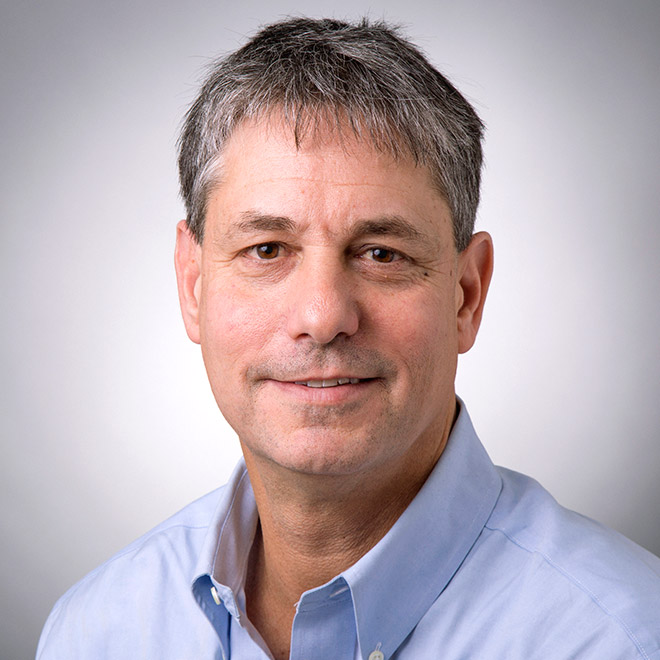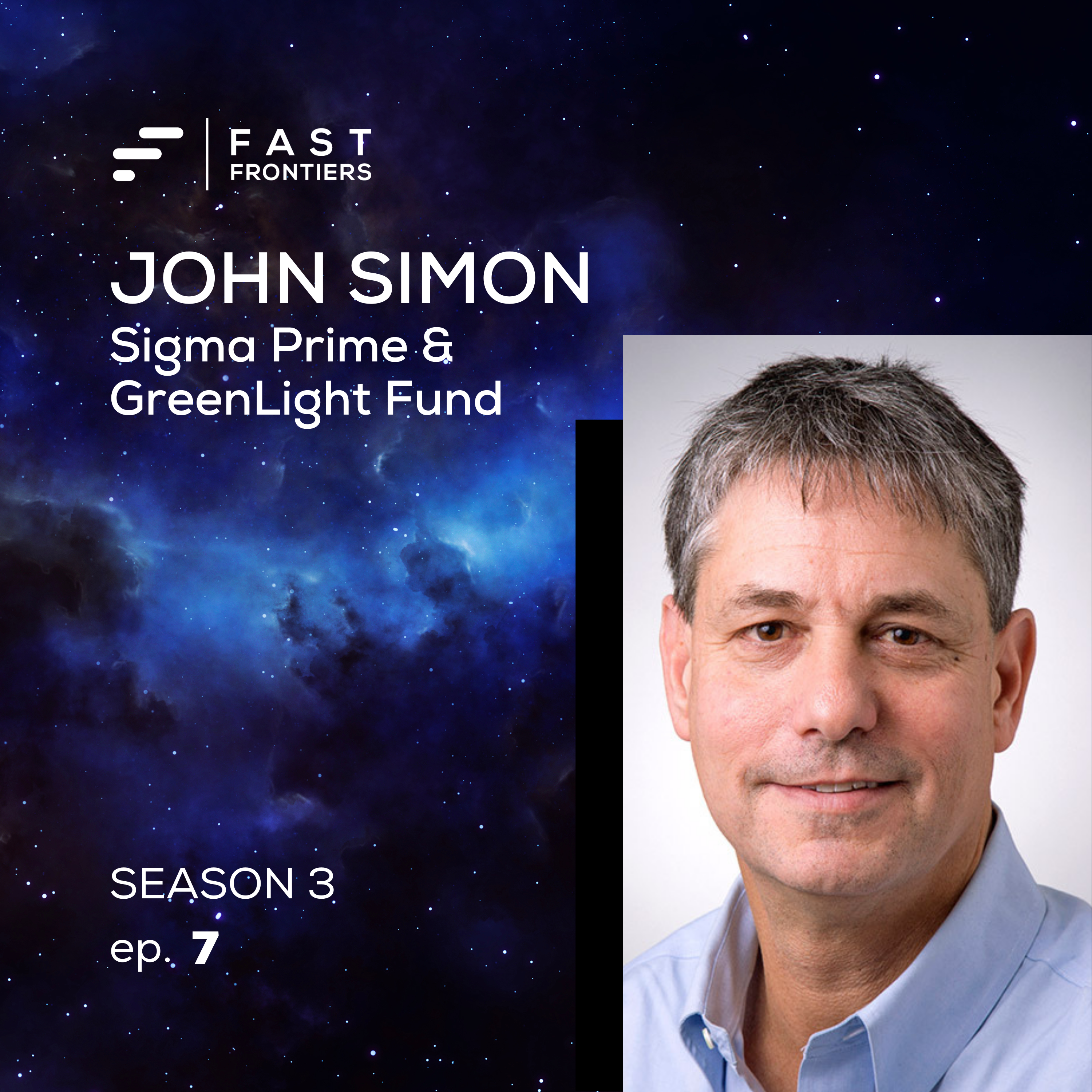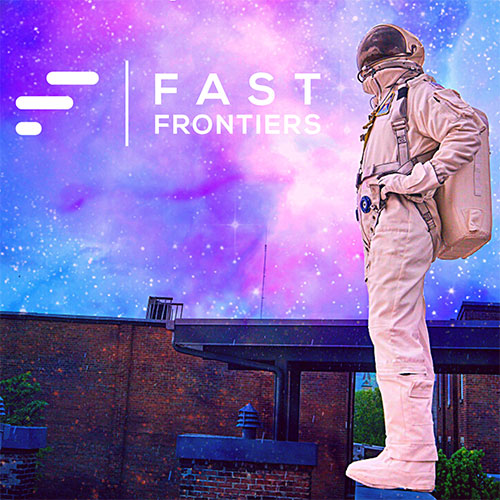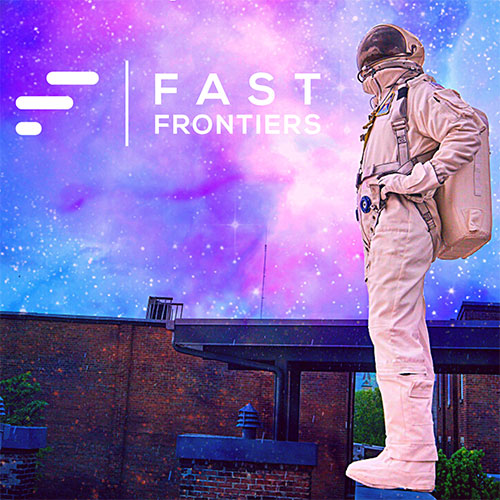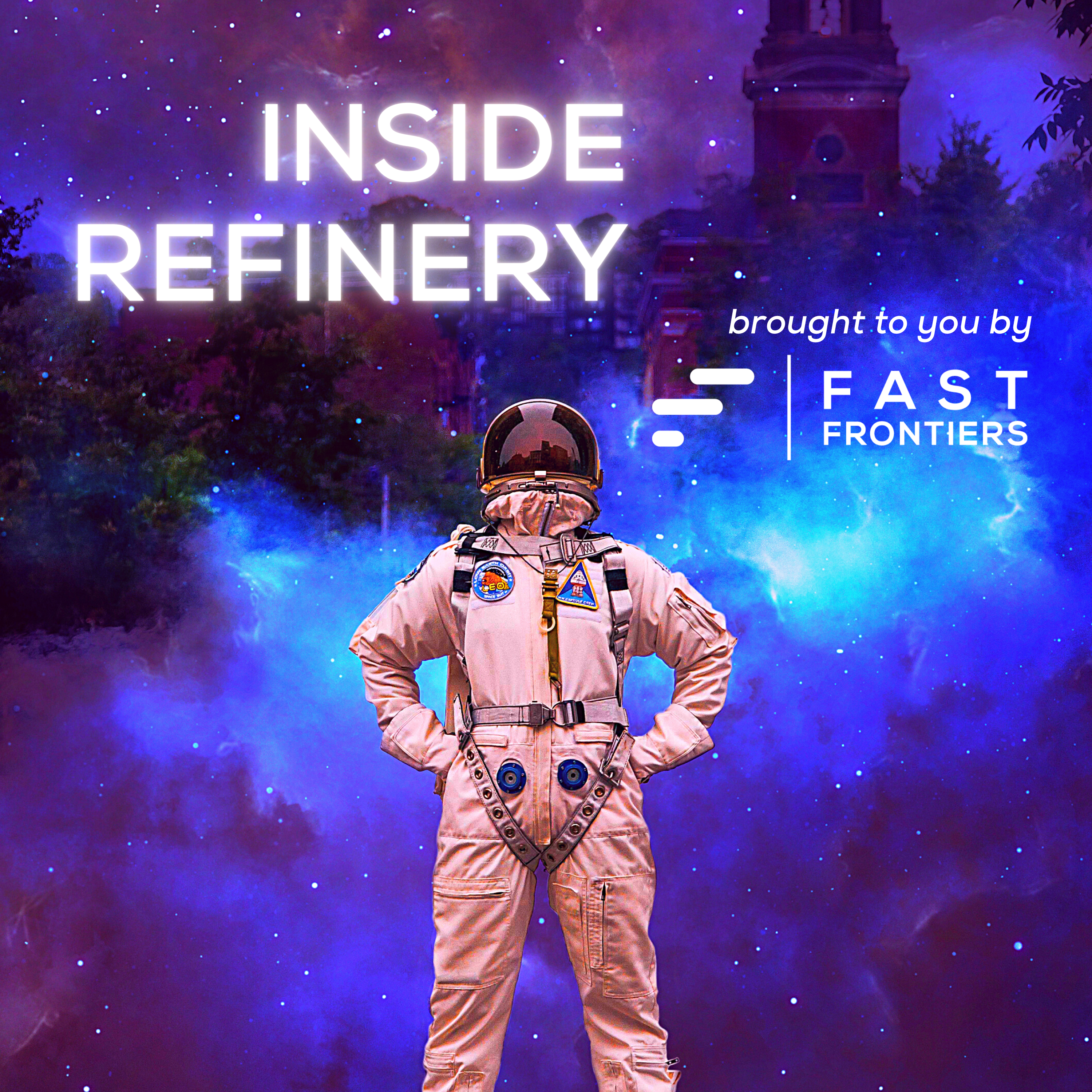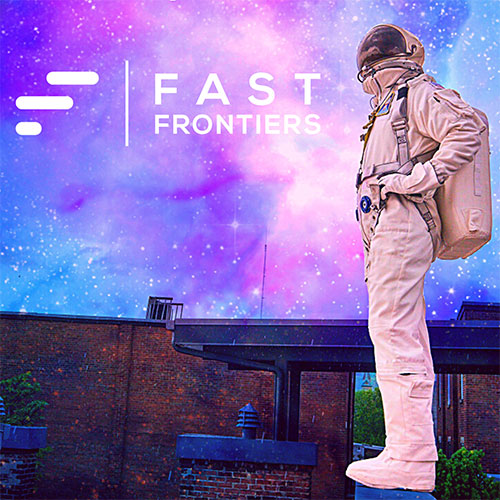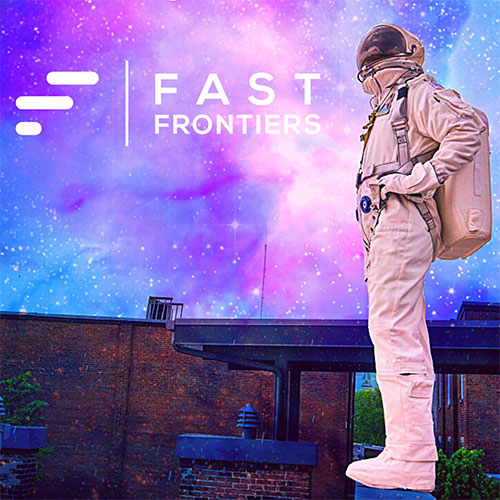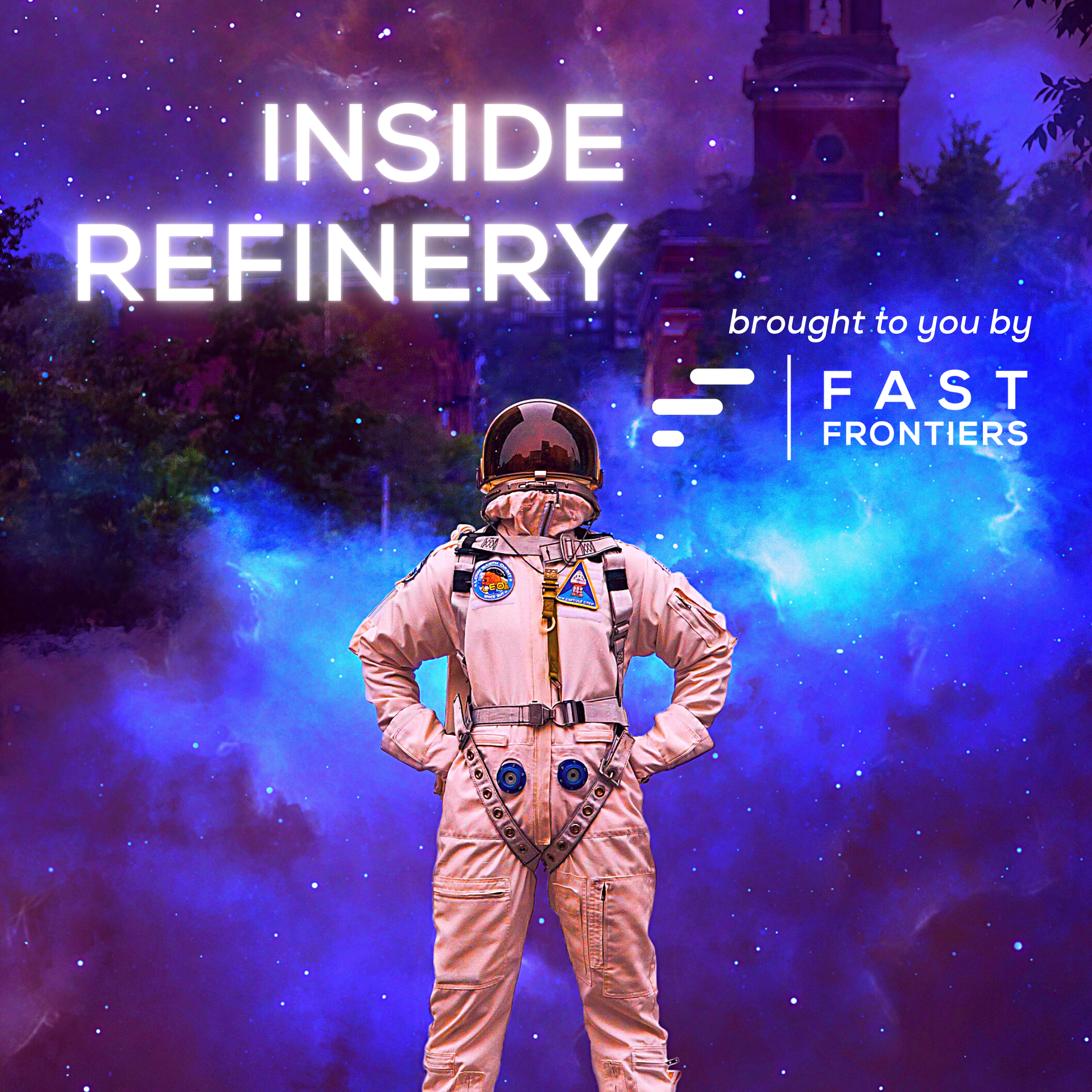S3 Ep 7. John Simon: Sigma Prime & GreenLight Fund
- 0.5
- 1
- 1.25
- 1.5
- 1.75
- 2
Tim Schigel: Welcome to Fast Frontiers, I am your host Tim Schigel, managing partner of Refinery Ventures. In today's episode, we're talking with John Simon, managing director at Sigma Prime Ventures and co-founder of the GreenLight Fund in Boston, Massachusetts. John joined Sigma Prime in November 2012, to help build the firm and help invest in great entrepreneurs. Previous to joining Sigma Prime, John was a co-founder and managing director at General Catalyst. In this episode, we're going to dive into John's venture career that he has used for good. Specifically, he co-founded a nonprofit called the GreenLight Fund, now in 10 cities across the US, which helps transform the lives of children, youth, and families in high poverty, urban areas by creating local infrastructure and a consistent annual process to identify critical needs, import innovative entrepreneurial programs that can have a significant measurable impact and galvanize local support to help programs reach and sustain impact in the city. The biggest theme inaudible, I hope you can take away from this conversation is this, a piece of advice John brought up during our conversation, "Take stock of your activities. We only have one life to live. What do we want to do and accomplish with that life? How do we make the most of our talents and capabilities and make the most positive and lasting impact that we can? Our work is an activity, our responsibilities and interests are an activity, but the master activity is life as a whole and how these are all threaded together to make a multidimensional and meaningful life experience." Please enjoy my conversation with John Simon. I've been looking forward to this all day, my friend John Simon, on Fast Frontiers. Welcome, John.
John Simon: So glad to be here, Tim. It's just awesome to be here.
Tim Schigel: Yeah, whenever I think I have a lot of energy, I then talked to John and realized that I'm woefully behind in terms of the amount of energy that comes out of you and everything that you do. You're an inspiration to me and I'm sure to a lot of other people. John is a partner at Sigma Prime in Boston, has a storied entrepreneurial and venture career that has also led him to apply that to doing good for urban communities in many different ways and we're going to get into that today. It's truly the Fast Frontier of doing well and doing good. So yeah, tell us a little bit more about Sigma Prime and some of the investments you've been part of.
John Simon: Yep. So Sigma Prime is a partnership, there are five of us that are partners at Sigma Prime. And we all are entrepreneurs who build companies, usually several different companies and then sold them and now have gotten together to help younger, next generation entrepreneurs build their companies, and provide all the scars, experience, and help that we can, energy and also capital to fuel people's ambitions and dreams. We love investing in enterprise software companies of all different kinds of stripes and sizes. Typically, getting involved at pre-revenue stages or series A type revenue stages, and we just love doing everything we can to help build great companies. We are investing our ninth fund now, we have a total in the Sigma family of over $3 billion under management. But we love small enough fund sizes that we can really have maybe 10 to 20 companies in a portfolio and just put all our weight behind all of those companies. We typically invest in Boston, New York and sometimes the Bay Area, but increasingly are looking all over the country for great entrepreneurs that we can back. We've had successful investments in Chicago, Indianapolis, and elsewhere, and it totally aligned with Fast Frontiers vision that, innovation is popping up all across our country and obviously even beyond, we have to be able to meet entrepreneurs where they are and back them anywhere, any way we can.
Tim Schigel: Talk a little bit about some of the most notable successes you've been part of that people might recognize.
John Simon: Yeah, I'll go a little bit back in history then in the Sigma franchise, because our Sigma Prime investments in this fund, some of the notable ones, CloudHealth Technologies, which was bought by VMware in a very large transaction, very successful company. Nasuni networks, a company that's doing a cloud- based file system, huge success and again, but still relatively early stage company, just sub hundred million dollar revenue but not that much. And then we have Phenom People, that is also in this portfolio, which is a unicorn type company in the HR and recruiting space. Also, a company called the Interactions, which is very large, very successful in the whole call center space, remaking how large companies, household brands do customer service over the phone. Lots of great stuff, but in general these aren't household names yet. If I go back in the Sigma family, a relatively recent investment that we were first round investors in, was DocuSign, that was a risky bet at the time has done extremely well. And the whole Sigma team for years, I think it took about 14 years to make an overnight success out of DocuSign, but obviously the entrepreneurs and the team and the investors were all just exceptional and Sigma was proud to be a part of it.
Tim Schigel: I like that story because it underscores in venture, it's all about the multiple and you wait it out and you want to wait it out for the ones that are going to be like a DocuSign where it's just massive, massive return. So it was worth it to say the least.
John Simon: Absolutely. Absolutely. Absolutely. Certainly things are moving faster in the internet era, companies are getting bigger, faster, but still people underestimate how long it takes to build a really, truly great company, and a lot of these quote unquote, overnight successes. It's really 10 to 15 years to build a really strong, great public company that you can be really, really, really proud of, and so people have to have longer term time horizons. Venture is not a quick turn game.
Tim Schigel: Right. Just so people understand we met in the early days of Cintrifuse when we started up the fund to funds and Sigma was our first investment.
John Simon: Yeah. Actually, our fund was closed. We opened it up just for you and Cintrifuse, not just because we liked you so much but because we really believed in the Cincinnati ecosystem and we really believed in all the big companies that could be great sources of innovation and sources of spin-outs and sources of startups, but also could be great customers for our companies. And that has proven true in spades.
Tim Schigel: I remember it well, while we were at a Reds game when you were in town visiting, and then you told us about this other thing you were doing, this other thing being GreenLight. Share with everybody where that inspiration came from?
John Simon: Yeah. So the GreenLight Fund, and we'll talk a little bit about it obviously but people can check it out on the web, www. greenlightfund. org. In some ways it seems like an unrelated thing. It's a nonprofit that myself and my co-founder Margaret Hall founded about 16 years ago to basically be a community driven Swiss army knife that would sit in communities across the country. Helping communities solve problems and unmet needs around lower income children and families and life outcomes, by identifying gaps and issues and things that just weren't being tackled or weren't being tackled at scale or results that weren't changing. And reach out and find organizations and solutions that had been successful in multiple other cities, but hadn't been in their cities. And basically every year do that for one gap, with one solution a year and over time to make a huge difference in a community. About 16 years ago this was just an idea, and I think when you and I started talking about it, we were maybe eight years into the journey. So we had proven a lot of things, but we hadn't proven as much as we really needed to. Now, 16 years in GreenLight is operating in 10, soon to be 12 cities with a 15 city waiting list, and last year we reached close to half a million children and families across our cities, and one of the cities being Cincinnati. Now, what's interesting is sometimes people see these as unrelated. Gee, on the one hand you do the venture business and on the other hand, you have this philanthropic interest and this interest in this organization called GreenLight, which I'm the co-founder and board chair of and a heavy donor to. But really I see it as one fabric, because what it's all about is creating organizations that stand the test of time and that deliver value to people. And I've always been interested in that, both in the for-profit and the not-for-profit worlds. And I think you can learn lessons in both worlds that can help each other. And so I see these things seamlessly knit together and obviously at this point, all the gains that I'm hopefully making on the venture capital side will come back to help fuel GreenLight and other kinds of nonprofit activities that help those amongst us who are most needing of just some scaffolding so that they can pull themselves up and just realize their lives and dreams that they want to.
Tim Schigel: So much of it just made common sense but also you could see how your venture experience shaped GreenLight in terms of the data-driven approach that you take. And yeah, when we started up, you had only been in a couple cities because it started in Boston.
John Simon: Right, we started in Boston, for eight years we were only in Boston and then after eight years, we ended up doing our second and third cities, which were Philadelphia and the Bay Area respectively. And we then had proven those areas for three to four years and really felt like with our Boston experience and our Philadelphia experience and the Bay Area experience, that we had something that we could take to any city across the country and then eventually do many cities, but we were thinking about what would be our fourth city. Basically you and Cintrifuse introduced me in a deeper way to Cincinnati, I'd been there before, but going to Cincinnati on a quarterly basis to do business work and try to intersect the Sigma portfolio, with the Cintrifuse ecosystem and look at great entrepreneurs and great investment opportunities in the Midwest. All of a sudden, I just you could see that there was going to be a great marriage between GreenLight and Cincinnati, and it seemed like fate. And there was a whole bunch of people that started to get interested in GreenLight. "Why not do it here as your fourth city?" And we did and it's been phenomenally successful, so successful that we just raised our second GreenLight Fund in Cincinnati that ensures we can do our work for the next four to five years with double the investors, a lot more capital donations deployed to GreenLight Fund Cincinnati too, we're just off to a great start there. So, couldn't be more happy that we have a GreenLight Cincinnati, which has not only been hugely successful but it's had ripple effects across our network.
Tim Schigel: Yeah, and the community was certainly very receptive to your message and to you, and it was amazing to see that kind of reaction and response. If we just slow down a little bit to people understand the model, I think it's really cool because you're constantly scouting for programs that work, right.
John Simon: Exactly.
Tim Schigel: That's the first thing, and then the second thing is the programs have to be able to work in a variety of locations, not just it happens to work in Kansas city so it only works in Kansas city.
John Simon: Absolutely.
Tim Schigel: So that makes them bullet proof right, the ideas by that point. Can you give an example of one just to make a tangent?
John Simon: Yeah. That's what we're looking, but actually backing up even a little bit more is when GreenLight sets up in a city, we raise a fund the same way venture capitalists have to raise a fund or private equity folks want to raise a fund or entrepreneurs have to raise money if they want to pursue certain kinds of business activities. So GreenLight raises a fund, there're typically, four or five million bucks that enables us to activate a city. And then we hire a local executive director and we build a selection advisory council that's going to be a sounding board for our local executive director who really is running GreenLight in that city on an annual basis. And once we've got all that set up, what we're really doing, the first stage every year, every cycle is we're listening to the community, what does the community need? What do community members who desperately want to move in a better, different direction that's not happening? What's a gap that's not happening? For instance, Kindergarten Reading Readiness, are the results very poor in that city and people desperately want to change it? Or things like the population of kids aging out of foster care, are the results incredibly poor for that group of deserving young folks where there's all kinds of terrible outcomes in terms of homelessness, incarceration, unemployment. And an unchanging negative result year, after year, after year, could that be changed? And so communities are coming to GreenLight every year, not about things that are happening because there's other places they can go about things that are happening, but what's not happening. And then every year in the end we end up, for one thing that's not happening. Then we do the scouting that you mentioned which is, okay, now that we know that here's an issue, this community desperately wants to move forward on and move in a different direction on. Can we find something that is an organization or a model that's been proven in an original city and then in multiple other cities and really works and really changes outcomes and really fits in six or seven other cities and ecosystems. And has a revenue model, even if it was a nonprofit, it has a business model because it's been set up in a talented, thoughtful way so that it can be sustainable. It can be scalable. It just happens not to be in our city. And so that's what we're looking for. And then at the end of the year, we can conclude, having looked at multiple issues and multiple opportunities. We end up bringing one thing to address that issue and help change it over time, and that one thing is the thing that had worked in multiple other places but it just wasn't here. So just to give an example, what you asked for in the first place, if we think about an issue like asset building and affordable housing. We in GreenLight Philadelphia one year, looked at this issue, which how could we have families that the average savings of families in affordable housing in Philadelphia, in certain geographies, and certain zip codes was very, very, very low. So low that it really prevented families from moving out of poverty, and it also prevented families from moving out of affordable housing, which would actually increase the availability of affordable housing. And so could we do something that could help families build assets and affordable housing at scale? And that was the challenge that was posed to us by the Philadelphia Housing Authority who came to us and say," Here's a massive issue, it impacts tens of thousands of residents. Is there something you could do to help?" And we found this organization operating in Boston called Compass Working Capital that has this phenomenal solution that just for time, I'm going to be short with, basically helps families build assets. And so I think over time as we brought this solution to Philadelphia in partnership with other folks locally and provided startup funds to help Compass Working Capital, create a Philadelphia arm and work in Philadelphia. Over time now for thousands and thousands of families, I think we've increased savings on average $8,000 to $10,000. And this has made a massive difference in the Philadelphia economy, but then also for these families and changed their lives and changed their lives trajectories. And also enabled more mobility out of affordable housing, which has increased the availability of affordable housing to others in Philadelphia. So it's like a win-win-win, and all of a sudden an issue that was status quo is moving in a positive direction because the Philadelphia community has helped make it happen. They've helped team with GreenLight to make it happen, and Greenlight has identified and worked with this solution and organization that turns out was a desperately needed missing puzzle piece in Philadelphia, but now as a part of the fabric of Philadelphia and changing outcomes. And that kind of thing that I just described, that's what we do year after year, every year in our cities. And by doing this year after year in all of our cities, we're learning. So if we ever looked at the same issue in Atlanta and decided to bring Compass Working Capital to Atlanta or something similar. We would take all the learnings from what we did in Philadelphia to see, can we do that even better, even more scalable, even deeper impact, even deeper systemic impact in Atlanta? And so by doing this every year in every city, we're creating this huge, you could look at it in AI terms, this huge data bank of learning and information and best practices and learning about what's really working? How do we optimize? How to make it better? What really is community responsive, so that every year when we help run this cycle on behalf of every community, that things can get better and better and more and more impactful.
Tim Schigel: Yeah. The network gets stronger right, so that's what's interesting about it. It's reinforcing, self-reinforcing so it's not just isolated solutions, it just strengthens itself over time.
John Simon: Exactly. Again, the lessons from for-profit, not-for-profit. In the for-profit world, we at Sigma and myself we're looking for investments that will, as you invest in something that gets a lead, then it can lengthen that lead. It can get stronger and stronger. It's business model, it's intelligence, it's ability to serve customers, its ability to innovate, accelerates. And so that you might take a lead or an innovation and have that grow over time, as opposed to get commoditized. How can something gets stronger and stronger and better and better? And that's the same way we look at GreenLight, which is, how can we keep getting continuously better and better and better at what we do, so we can be more and more in service of the communities that we are in. And of course, as we get stronger and stronger, be able to get to more communities and right now we're adding one community a year, but eventually we want to get to the point where we can add a couple a year.
Tim Schigel: And you've also seen, I believe when you come into a community like Cincinnati, and you meet with some of the leaders who tend to be the same leaders in a lot of the community nonprofits, right. It's some of the same folks which, God bless them, they're awesome, but there are a lot more people in the city they could be helping. So you also seem to be able to attract potentially a new group of people or a different set of people that haven't been leveraged and their talents haven't been used and deployed, right?
John Simon: Yeah, I think we can look at that a couple of different ways. So, one way is because GreenLight every year is doing something new for a city, we have a chance together with the organizations or models that we ended up bringing to a city to hire new leadership. So when we bring Compass Working Capital to Philadelphia, we hired somebody to head up Compass Working Capital in Philadelphia. When we look at Cincinnati and we brought First Place for Youth for Cincinnati, we had to hire somebody to lead up that program that helps kids aging out of foster care and transforms results. Or when we brought Family Independence Initiative to Cincinnati, to help families build wealth and build savings and create economic and social mobility for themselves. We had to hire somebody to lead Family Independence Initiative. We had to hire somebody to lead, Center for Employment Opportunities, which is all around prison recidivism, we brought that to Cincinnati. So doing one new thing a year enables us to hire leaders, and we can get folks from underrepresented groups that haven't been given the opportunity to lead that now are leading a major initiative in a city. And as they grow and build their leadership skills and then build their organizations, essentially we're building a whole cadre of next generation, nonprofit leaders over time in a city. And once we're at scale over long-term in a city, so in Boston we've been operating for 16 years, it's our longest city. We have 12 organizations, we've had maybe 24 leaders because you have a leader and then eventually that leader passes the baton to somebody else. Most are leaders of color, mostly from underrepresented populations, they're doing incredibly well, and that's a whole next generation leadership set in Boston. That's really helping us forward as a community and helping show that opportunity isn't just for a few or for people that look a certain way, that there's huge amounts of opportunity in the nonprofit world for new next generation leaders. For instance, there's probably a couple of hundred team members who are incredible, that they wouldn't be doing what they're doing, their organizations wouldn't be in Boston if GreenLight didn't help on behalf of the community to make that happen. And these organizations are drawing tens and tens of millions of state, federal, and other kinds of funds in to help on an annual basis great things happen. So it's a whole ecosystem, the GreenLight who is building to make change, but also as you alluded to, we're trying to add to the donor ecosystem. US is a very charitable country. I think something on average of 2% of earnings go to philanthropic donation, charity, which is much higher than a lot of other countries, but yet obviously... And we'd like to see that even higher. We think it can grow even beyond that, the way to have it grow is to create value props that the donors believe. It's just too good not to add incremental dollars to, and so we are trying to draw people off the sidelines to get folks involved who maybe have historically given to their kid's school, college, their Alma mater their church, temple, mosque. But we're saying, "Well, you can also give to things that help around poverty and economic and social mobility. That help around social justice, that has help around racial equity, and you can give to things that make a difference, give to GreenLight and you'll see it will make a huge difference. Once you do that, start giving to other things as well." And we're hoping that we're a bit of a gateway where people get involved, they see how fulfilling it is, they see what kind of difference can be made, and then they start doing a lot more. They start giving to United Way, they give to the community foundation, they give to the food bank, they give to inaudible. They start to see that there's a lot of things people can do to make a difference, and we're just one of those, but we want to build coalitions and draw new people into the process.
Tim Schigel: And for entrepreneurs listening, there's experience I had that I think you share or relate to, which is, it's a pillar of Refinery about leadership. You start out as a tech entrepreneur let's say, and you're building a company and let's say you're lucky enough to be successful, and next thing you have a lot of influence on your employees, on their families, on the places where they work, your communities and I don't know that people are prepared for that. You don't think about that certainly, necessarily when you're starting a company, just trying to get things to work. But leaders have an incredible amount of responsibility and influence in their communities and you don't have to wait until you're successful to have that influence, you can start right away.
John Simon: Yeah, I agree. I mean, some people obviously build it in the fabric of their company. You think about Tom's of Maine or Ben and Jerry's, it's a core value, and we want to make a huge difference in our community and in our country and in our world, but you don't have to start that way. You can start as an entrepreneur by having a vision around a problem that you want to solve that's a business problem, and then a culture that you want to create and a team that you want to create. And you build a platform, you build a team, you start to build a customer base, you build an ecosystem, you start to build a company. It's never too early or too late to say, "You know what, we want to also imbue our mission with social purpose. We want to also do something to benefit the community in which we work and live, the country in which we work and live, and then the world in which we work and live." And I'm always encouraging people, get involved a bit earlier than you thought because you do have the extra hours in the day that you don't think you have. You do have the extra financial capacity that you don't think you have, and like anything else by getting involved early, you'll be better at it. By the time that you have more time, energy, and resources to devote to it you'll know more what you want to do and you'll be better at it. There's no such thing as starting too early. You can just get started with a single step, just take the plunge and start to do a little something, and then you can do a little more, and then a little more, and over time it snowballs.
Tim Schigel: And you've taken it further, not just with GreenLight Fund, but also your VentureForGood program which is, you're an investor in many, many companies through that. And the proceeds of which, and the profits of which you put back into GreenLight or other charities.
John Simon: Yeah. Yeah. So loving investing, loving helping entrepreneurs, loving helping build companies, there are often situations where it's not a fit for Sigma, which always is the first call on my investment activity, if there's anything that comes along that could be a fit for Sigma, that's first priority. But oftentimes are investments that come along, they're not the right stage for Sigma, they're not the right industry domain, or there's not the right investment allocation. At Sigma, we want to own 10 to 20% of a company and be a core partner. Sometimes there's just tiny amounts of additional capital available for an angel like activity where somebody could also be helpful and be a mentor or a coach in some way, or help with something. So those are opportunities that fall outside the Sigma bucket, they're opportunities for VentureForGood, which is a personal investment, a holding company for venture capital investments. Make a handful, anywhere from four to six investments a year, they can range in size. But looking to make great winning investments behind great entrepreneurs. And then with the carried interest or the profits on those to dedicate that all to charity, that's why we call it VentureForGood. And right now the primary beneficiary of that will be GreenLight, to help fuel GreenLight to have deeper and better and more systemic impact on all the cities that we're in. By helping us grow and continue to grow to other cities, one a year and eventually reached three to five million children and families a year in the cities that we're in. But I do hope that the investments are successful enough, there'll also be some access to donate to other very worthy causes as well, which is definitely what I'm planning to do and already doing a bit of. Because there's no monopoly on great ideas, there's a lot of people doing amazing things and deserving of all kinds of support.
Tim Schigel: And it's amazing, because you're basically planting seeds that are able to sprout and continue to feed GreenLight through all these relationships you've developed and over time and opportunities that you get to see, as a VC you get to see a lot. And those companies by doing well are also doing good directly or indirectly because of your VentureForGood, which is awesome.
John Simon: Yeah, I see this as a reinforcing thing. Well again, these are distinct activities. I mean, Sigma is an activity, GreenLight is an activity, VentureForGood is an activity, but the master activity right, is life. We only have one life to live and what do we want to accomplish with that life? And how do we want to make the most of our talents and capabilities and make the most impact, the most positive impact and the most lasting impact that we can? And that's where I then see all these distinct activities as being linked and reinforcing each other and helping each other, because everything gets stronger when you live a multi threaded life like this, hopefully.
Tim Schigel: And Refinery, we are part of GreenLight, supporting GreenLight and want to encourage other entrepreneurs to do the same or do their favorite charity or the cause that's important to them. What other message would you have for entrepreneurs?
John Simon: Well, I mean, I love that message of learning about GreenLight, thinking about whether you might want a bake GreenLight into setting some stock aside for good or whatever. And people can help in various ways, whether it's donating to us nationally, whether it's donating to a city that we're in, whether it's serving on a selection advisory council in the city that we're in? Or just engaging your company in volunteering for a city that we're in. And again, we're in 10 cities now soon to be 12 and eventually 25 to 30 cities. And also the cities that we're in, whether it's Cincinnati, Boston, Atlanta, Philadelphia, Bay Area, Detroit, these are hubs of entrepreneurship, and so I certainly love that. And people can help in different ways. Just a funny thing today, I got an email from Steve Pagliuca, who's a partner at Bain Capital, also a donor to GreenLight and also happens to be a co-owner of the Boston Celtics. And he was invited to play in this Bloomberg Bracket, which I think it's now out there on the web, all these Titans of industry that are playing a bracket game against each other and had to have a $10,000 entry fee, and it all gets pooled, and then everybody's playing for a charity. At the end, the people that have the three best brackets, all the money in the pool I think it's equally divided between the charities of the three winners and Steve Pagliuca's charity is the GreenLight Fund. So, let's all root for his bracket.
Tim Schigel: Root for his bracket, yeah
John Simon: Yeah, But, anyway, more serious answer to your question, I just would encourage people, these days communities are in need. The places that we work and live there are those who really could use some help with some dismantling barriers and some access to opportunity. And so, as you're building your company, think about baking that into your fabric. That we are going to build a great company. We're going to help the community in which we work and live. We're going to help the country in which we work and live, and we're going to help the earth in which we all inhabit. Just thinking about baking that in, because that's going to give more meaning to your company, more meaning to your product, more meaning to your customers, and certainly more meaning to your employees. Team members. There's a war for talent out there, and people want to go work someplace that they believe in and that they believe is also having ripple effects across the world. It doesn't have to be political ripple effects, it can be doing good ripple effects and I just encourage entrepreneurs to think about that and think about their company as a potential ripple force for good.
Tim Schigel: That is a great message. I hope entrepreneurs all over the country are able to hear this and make that impact in their own unique ways. John, thank you very much for coming on Fast Frontiers. It's been a pleasure
John Simon: Anytime Tim. Totally believe in you and Refinery and what you're doing, and the thing is I want to stay at the edge of these Fast Frontiers.
You are. You are my friend. No risk of that. Thanks for listening to Fast Frontiers, if you like our show and want to know more, check out our website, FastFrontiers.com. If you enjoyed this episode, please share it with others and give us a rating and review on your favorite podcast platform. Join us next week when we bring you my conversation with Roy Bahat, head of Bloomberg Beta. The Fast Frontiers podcast is brought to you by Refinery Ventures, our producer is Abby Fittes, audio engineering by Astronomic Audio, marketing content and social media support from Content Callout and our podcast platform is Casted.
DESCRIPTION
In today's episode, we're talking with John Simon, Managing Director at Sigma Prime Ventures and Co-Founder of the GreenLight Fund. We're going to dive into John's venture career that he has used for good, and discuss the activities and impact we can make on our communities for a multidimensional and meaningful life experience.
Today's Host

Tim Schigel
Today's Guests
